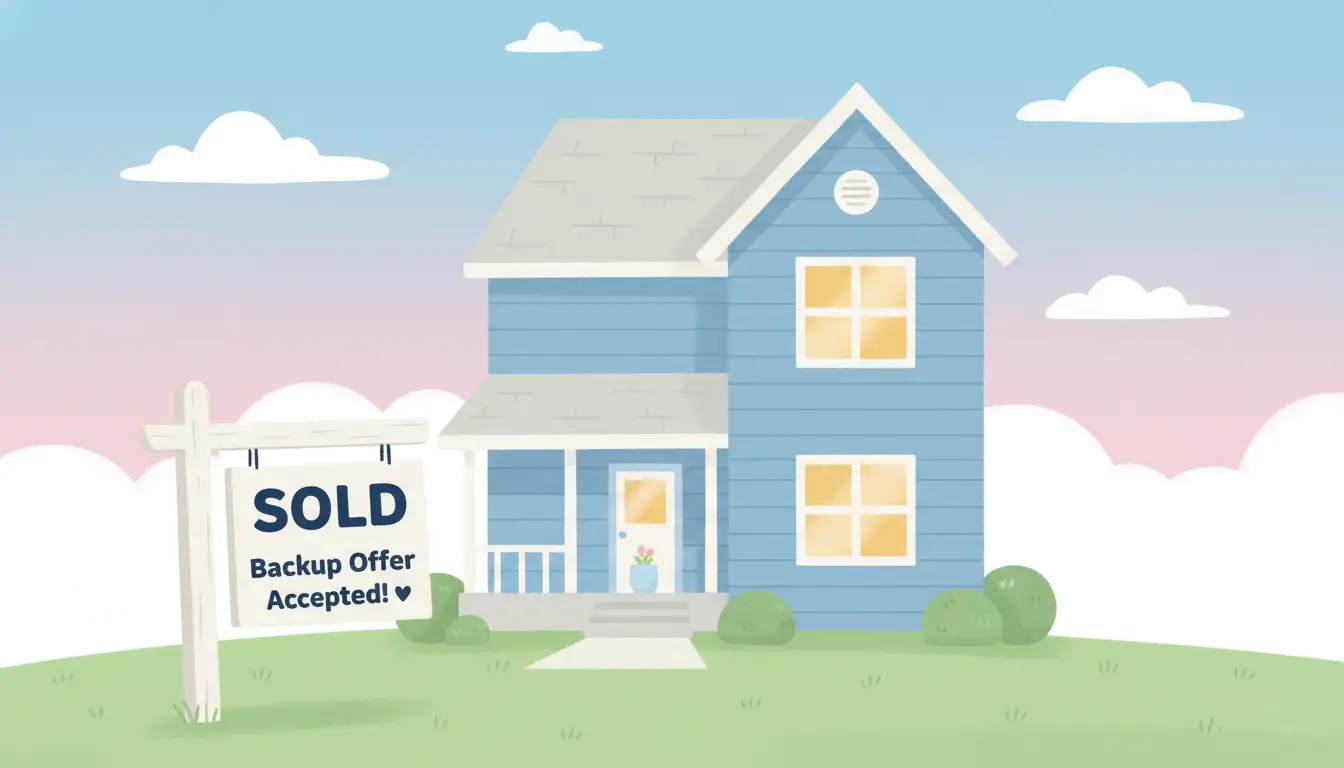Backup Offers: The Truth That Helps You Win Home Bids
You found it. After months of searching, you discovered the perfect home, only to see those three soul-crushing words on the listing: “Sale Pending.” It’s a common problem that leaves buyers feeling defeated and ready to give up on their dream property. The question then becomes a desperate whisper: Is it even worth it to make a backup offer?
Many prospective homeowners dismiss the idea, assuming it’s a long shot not worth the effort. They believe the initial deal is set in stone and that their chances are virtually zero. This hesitation is the core of the problem, a misunderstanding of how fragile real estate transactions can truly be.
You'll Learn About
The Agony of “Sale Pending”: Is a Backup Offer a Waste of Time?
In the competitive real estate landscape, particularly the frenzied market of 2021, seeing a home go under contract felt like a final verdict. However, an accepted offer is far from a closed deal. A surprising number of primary contracts fall apart for reasons that have nothing to do with the house itself, opening a golden window of opportunity for the savvy buyer waiting in the wings.
A backup offer is a legally binding contract submitted to a seller even after they’ve already accepted a primary offer. If the first deal collapses for any reason, the backup offer automatically moves into the primary position without the house going back on the market. This strategy provides security for the seller and a second chance for a determined buyer.
Thinking of it as a waste of time is a significant strategic error. It costs nothing to submit the offer, and it positions you to capitalize on the unpredictable nature of real estate closings. Rather than a hopeless gesture, it’s a calculated move that can, and often does, pay off.
Why First-Place Offers Falter: Your Second-Place Opportunity
Understanding why initial deals fail is the key to appreciating the power of a backup offer. Primary contracts are often loaded with contingencies—clauses that allow the buyer to walk away without penalty. These escape hatches are where your opportunity lies.
Financing Failures: The Most Common Deal-Killer
The most frequent reason a sale collapses is the buyer’s inability to secure a mortgage. A preapproval letter is not a final loan commitment. During the underwriting process, a lender scrutinizes the buyer’s financial health, and any negative change—a new car loan, a job change, or a dip in their credit score—can lead to a denial.
Even in stable financial situations, fluctuating interest rates can suddenly make a mortgage unaffordable, forcing the buyer to withdraw. When financing falls through, a seller is left scrambling, and having a solid backup offer ready to go is an ideal solution for them.
Inspection Nightmares: Uncovering Hidden Problems
The home inspection is a major hurdle in any transaction. An inspector might uncover significant issues like a faulty foundation, an old roof, or serious plumbing problems. These discoveries can lead to contentious negotiations over repairs.
If the buyer and seller can’t agree on who will pay for the fixes, the buyer can use their inspection contingency to terminate the contract. This is particularly common with first-time homebuyers who may be easily spooked by necessary repairs. Sometimes a persistent issue, like realizing the property has an aerator tank overflowing, can signal deeper system-wide problems they aren’t prepared to handle.

Appraisal Gaps & Contingency Clauses
In a hot market, bidding wars can push a home’s sale price above its appraised value. When the appraisal comes in low, the lender will only finance the appraised amount. This leaves the buyer to cover the “appraisal gap” with cash—something many can’t or won’t do.
Other contingencies also pose a risk. Many buyers include a clause that makes their offer dependent on the sale of their current home. If they can’t sell their property in time, the deal is void, and the seller is back to square one, making your backup offer suddenly look very attractive.
From Runner-Up to Homeowner: Crafting a Winning Backup Offer
Simply submitting a backup offer isn’t enough; it needs to be strategically crafted to be as appealing as possible to the seller. Your goal is to present an offer so strong that the seller is secretly hoping the first one fails. Your agent should communicate that you’re not just another offer, but a serious, committed buyer ready to close.
Step 1: Present Impeccable Finances
Your financial strength is your greatest asset. Submit a backup offer with a full mortgage pre-approval from a reputable lender, not just a pre-qualification. If you can pay with cash, you instantly become a top contender.
A substantial earnest money deposit also signals that you are a serious buyer. This deposit shows you have skin in the game and are committed to seeing the deal through to closing. Make sure your proof of funds is readily available and clearly presented.
Step 2: Minimize Contingencies (Strategically)
The fewer hurdles you place in front of the seller, the better. A primary offer loaded with contingencies can make a seller nervous. Your backup offer can stand out by having fewer of them.
Consider waiving non-essential contingencies, but always with caution and professional advice. For example, if you are confident in the property’s condition, you might shorten the inspection period or agree to an “as-is” purchase for minor issues. This reduces the seller’s risk and makes your offer more compelling.
Step 3: Offer Unbeatable Flexibility
Sometimes, the most valuable thing you can offer a seller isn’t money—it’s convenience. Be flexible with the closing date. The seller might need extra time to find their next home, or they might want a quick close.
Accommodating their timeline can make a significant difference. You could also offer a rent-back agreement, allowing the sellers to stay in the home for a short period after closing. This small gesture can alleviate a huge amount of stress for them and position your offer as the path of least resistance.
Understanding Your Odds: When Do Backup Offers *Actually* Work?
While there are no official statistics on how often backup offers get accepted, experienced real estate agents will tell you it happens more often than you think. Success often depends on the specific circumstances of the primary offer. The table below outlines various scenarios and how they might influence your chances.
| Scenario of Primary Offer | Likelihood of Your Backup Offer Being Accepted | Reasoning |
|---|---|---|
| Primary Buyer Has a Home Sale Contingency | Higher Chance | This is a major variable. If the primary buyer’s own sale falls through, your offer can slide right into place. |
| Primary Offer is Financed (vs. Cash) | Moderate Chance | Financing is the #1 reason deals fail. Underwriting issues, job changes, or new debt can derail a loan at the last minute. |
| The Property is Older or a “Fixer-Upper” | Higher Chance | Older homes are more likely to have significant issues uncovered during inspection, leading to disputes over repairs. |
| Primary Buyer is a First-Time Homebuyer | Moderate Chance | First-time buyers can be more easily intimidated by the process, inspection findings, or the final financial commitment, leading to “cold feet.” |
| Primary Offer is All Cash with No Contingencies | Lower Chance | This is the strongest possible offer. It’s not impossible for it to fail (e.g., buyer’s remorse), but it is much less likely. |
| The Listing Agent Expresses Doubts About Buyer 1 | Much Higher Chance | If your agent gets a sense from the listing agent that the first deal is on shaky ground, your odds increase dramatically. |
The Proactive Backup Strategy: More Than Just Waiting
Submitting a backup offer and passively waiting is a missed opportunity. A proactive approach involves your real estate agent maintaining open, professional communication with the seller’s agent. This isn’t about being pushy; it’s about being present and helpful.
Your agent can periodically check in, reminding the listing agent that you remain highly interested and are ready to proceed at a moment’s notice. This builds rapport and keeps your offer top-of-mind. If the primary buyer starts making unreasonable demands after the inspection, the seller will feel more confident pushing back if they know your clean offer is waiting.
This proactive stance can also provide valuable intelligence. A good agent can often gauge the health of the primary transaction through subtle cues from the listing agent. This insight helps you know whether to stay patient or move on to other properties.
Is a Backup Offer Legally Binding?
Yes, once a seller signs your backup offer, it becomes a legally binding contract, contingent only on the failure of the primary contract. This is a critical point to understand. You are committed to purchasing the home if the first deal falls through.
Because of this, you cannot go and place other offers on different homes while your backup offer is active unless your contract includes a specific clause allowing you to withdraw. This is why making a backup offer is a serious decision. It’s best suited for a home you truly love and are willing to wait for.
The legal document used is often called a “backup offer addendum,” which clearly outlines the terms. It specifies that your contract moves into the primary position immediately upon written notification that the first contract has been terminated. At that point, your own timelines for inspections and closing begin.
The Final Verdict: Should You Make a Backup Offer?
Making a backup offer is a strategic decision that can turn disappointment into opportunity. While the primary deal may close without a hitch, a significant percentage of transactions fail, and being in the backup position costs you nothing but can gain you everything. This was true in the competitive 2021 market and remains a powerful strategy today.
The key is to be strategic. Work with your agent to craft an offer that is not just a placeholder but a genuinely superior alternative for the seller. By presenting strong finances, minimizing contingencies, and offering flexibility, you provide the seller with a valuable safety net. As you wait, you can dream about future projects, like finding some temporary countertop ideas for the kitchen or planning your winter tool storage, like perfecting your electric snow blower cord management.
Don’t let a “Sale Pending” sign be the end of your journey. See it as an invitation to make a smart, strategic move that could land you the home you thought you had lost forever.

